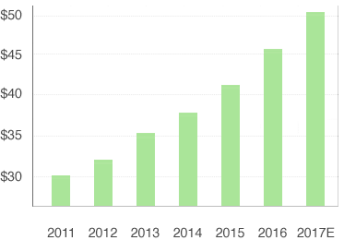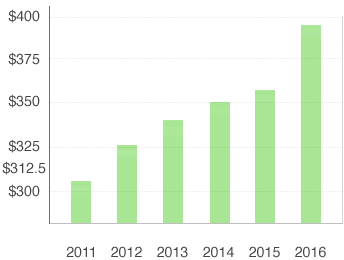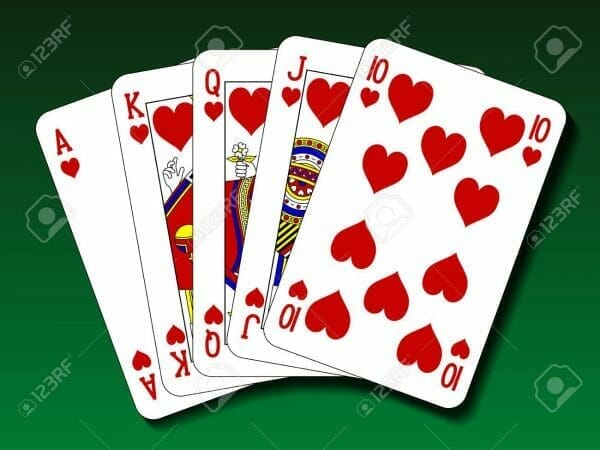Sitting down at a poker table in a real life casino for the first time is a nerve wracking experience. It’s different when you play online. You’re probably not dressed for the casino and the surroundings aren’t alien and loud, with flashing lights. You’re also not surrounded by stone-faced stoics with their variously sized chip-stacks.
The cards are conspicuously sharp around the edges and even if you’ve played for years online or elsewhere, the rules may temporarily evade you when the cards are dealt. When do I fold? How do I call? They make it seem so easy onscreen at the World Series of Poker (WSOP).
My first ever hand at the Niagara Falls casino showed me a pair of pocket aces, and the flop gave me another ace. I relaxed. Life was good.
Now that Jackpot Digital (JP.V) has released two major gameplay features to its Jackpot Blitz electronic game platform, it brings in the best of both worlds.
Jackpot builds touchscreen accessible table-games for the cruise ship and casino industries. The company’s specialty is multiplayer games, including poker and other casino games like blackjack and baccarat, accompanied with a suite of back-end tools for operators to control and optimize their gaming business.

The two new features are called Bad Beat Progressive Jackpot and a house banked side bet, Bet the Flop. They have increased product revenue per table by more than 10 per cent year through two months of operation.
Here’s Jake Kalpakian, the company’s CEO:
As a poker player, I have to say that it’s absolutely impossible to completely trust a computer algorithm to play fair. Every so often, you can recognize and exploit patterns and make big returns on otherwise shitty hole cards because you’d been there long enough and witnessed enough hand progressions to figure out (within a degree of probability) what hand is being rehashed.
With standard card-in-hand poker, if someone tells you they know how to count cards they’re full of shit. When the hands are done, the dealer reshuffles and redistributes cards at random.
The best someone can do is some calculated math in their heads at certain times and circumstances during the poker game. For example, say you’re on the turn with a flush draw and you’re wondering what the probability is on pulling a flush on the river. Remember—there are 52 cards in a standard deck and 13 cards per suit. Since you’re on a flush draw, it means you’ve got four cards of the same suit, which means you’ll need to draw one of the nine remaining cards to hit your flush.
Since you’re on the turn, you’ve seen four cards on the board and two in your hand, meaning there are 46 cards left.
That’s 9/46, which equals 0.20, so that’s a 20%, or 1 in 5 chance of hitting the flush on the river.
Do you feel lucky?
That’s not the same as counting cards—that’s being a smart poker player, and that’s perfectly legal at every casino. When you play electronically, you get the same effect—the math stays the same—but there’s another hidden component to be considered: the algorithm.
It almost becomes a game within a game. You have to be mindful of your opponent’s behaviour like in standard poker, but you also have to be mindful of previous algorithmic patterns to know how to get maximal leverage out of your bets. Depending on your perspective that can be a lot of fun, or it can be a major headache.
Guaranteed, though, there are folks out there having fun on these tables.
Last month was especially lucrative for Jackpot. One of the company’s Jackpot Blitz tables brought in more than USD$11,000, which was the most profitable single table month since the project launched in 2017.
“The launch of Bad Beat Progressive Jackpot and Bet the Flop have been very positive, helping us deliver new revenue opportunities to our customers and increasing our revenue in turn. We continue to build on the value proposition of Jackpot Blitz; it’s more fun to play, costs less to operate and generates more money than a traditional poker table, while players still enjoy the same social interaction,” Kalpakian said.
Here’s another consideration for Jackpot. The online gambling crowd (those used to dealing with computerized algorithmic gambling) is anticipated to reach USD 73.45 billion by 2024 owing to rising prevalence gambling across the globe. Technological advancements and addition of new regulations are expected to boost market demand over the forecast period.

If this company’s games can appeal to the casino crowd, then it could potentially tap into the multi-billion dollar casino market as well.

—Joseph Morton






